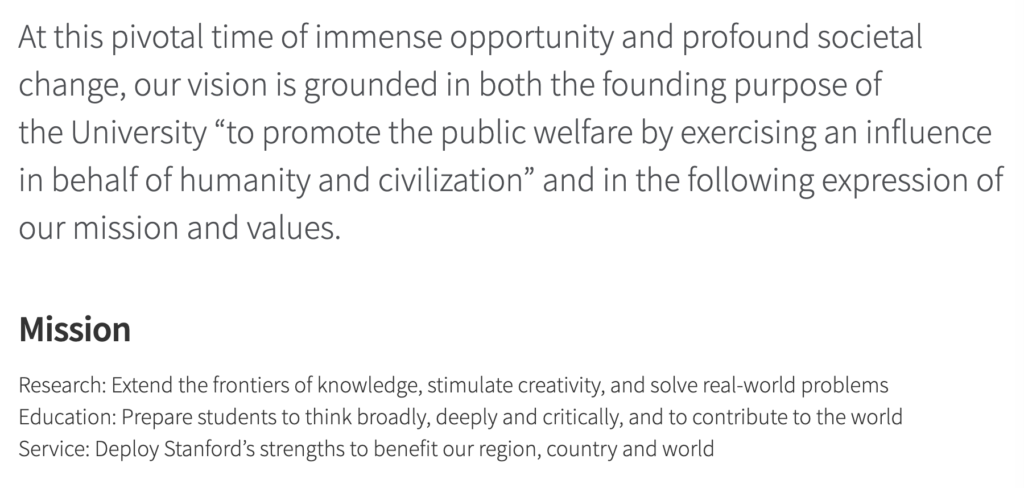What if we could measure value in units besides dollars?
This week in talk to your friends in other disciplines, already: going for a long walk with an economist friend reminded me that revelations happen when you make the small tweak of talking to people who ask different questions of the world than you do. Mine: the vast majority (all?) of the cost/benefit analyses of humanities higher ed measure cost in minute detail and do nothing at all to measure benefits.

This problem of not measuring benefits with the same precision as costs, she tells me, is common in subfields like environmental economics. Her illustrative example: when we talk about cleaning up polluted waterways, we carefully account all the costs of the process in time, technology, infrastructure, public education, and so on, with dollar figures attached to each. But then we say that the benefit is “a clean lake.” We do not measure those benefits. We might point to everything from ecosystems that flourish instead of decline, animals that have a source of clean drinking water, generations who learn to swim, communities that have a place to relax. But what are metrics for measuring these things? How many kids who learn to swim before they are twelve, say, do not die prematurely of drowning? And what price do we put on their full lives? How do we know how much a flourishing local ecosystem is worth?
This feels to me like an important, largely ignored, problem in public discussions of the values of studying things like history or literature. We enable conversations in concrete, dollar-based terms about costs (buildings, salaries, overhead, books) and then talk about benefits in the unquantifiable terms of knowledge and skills.
I am not sure there are ways to quantify knowledge or skills in concrete dollars. I am even less sure that I want to. But I do think this conundrum lies at the heart of why “defenses of the humanities” (a phrase/concept I bristle at) often feel like they lack teeth–because it seems as if we are responding to a crisis of a price-tag with a solution of a philosophy, and everyone knows you can’t pay your electric bill with ideas. In short, if a problem is framed in terms of dollars, then a convincing solution cannot be framed in some other currency.
And so if we cannot describe the value of humanities disciplines or higher education in precise dollars (which I am not arguing we ought to try try to do), then the better solution might be to reframe the question/problem.
Rather than, “it costs this many dollars” to educate one student at X institution, we might think about what it costs–in lost creativity, innovation, or problem-solving–not to educate those students. If the costs are framed in terms of ideas, policies, or human understanding, then framing benefits in those terms not only makes sense but sets up an actual comparison that can be assessed.
Is it worth $5 million dollars to clean up that lake? I don’t know, if the answers are “more kids will know how to swim, and the ecosystem will be thriving.” How can I tell if that is “worth” $5 million?
Similarly, if you ask whether it’s “worth” $2 million to keep Stanford UP in operation, and you cannot itemize $2 million of benefits, it is easy for a provost predisposed not to want to support the press to conclude that NO, THIS IS NOT WORTH IT. But if the value of the press can be articulated in terms of clear benefits, and the costs of losing the press can be articulated in parallel terms, then the relative worth of the costs and benefits can perhaps be assessed by someone predisposed to want to use a balance-sheet style argument.
The difficulty, of course, is that we are often in conversations about higher education, or literary studies, with economists who do not study environmental economics or with business-school graduates who are not predisposed to believe deeply in the liberal arts model of education. They are accustomed to making arguments in terms of dollars, and we are accustomed to making arguments in terms of principles, and so we fail to convince them.
But part of the reason we fail, I think, is that we let them set the terms of the argument. We cannot concede their premise that the only unit of cost/benefit is the dollar, then fail to articulate benefits in terms of dollars, and think we have any hope of being convincing.
Instead, we ought to challenge the premise to begin with: why should costs only be measured in dollars? This does not seem like an easy sell, and I have no interest in pretending that it is. I also am not naive enough to think that we don’t need to know anything about the money in higher ed: if we want to talk to people who care about a certain kind of data, we ought to try to understand that data and be able to think and talk in those terms.
But we might also point out that they should do the same for us.
We may not be able to turn them all into my economist friend, who is predisposed to assume value in disciplines, methodologies, and approaches that are not her own. But we might be able to avoid the hand-wringing “defenses” that are so ineffective, if we spent a little more time pointing out that the terms of the discussion are different depending on one’s methodological approach, and that if humanists are willing to engage in the terms of money, then bottom-line-balance-sheet people ought also to be willing to engage in other terms of value.
The founding principles of many institutions of higher education (and their university presses, in fact) were not anchored in precise economic arguments, but rather in arguments about education as a public good. I would venture to guess, though I obviously have not read every single one of them, that the mission statements of colleges and universities do not generally contain the word “money” or even phrases like “economic prosperity.” Instead, they look like this:

online at: https://ourvision.stanford.edu/vision-initiatives/mission-values
If universities take as their mission some version of promoting the public welfare, they are in fact inviting arguments about value that are not framed solely in terms of finances.
And to those who would note that well-endowed private institutions have the luxury to be able to claim as their missions things that are not necessarily monetary, I would point to long-standing public institutions that do precisely the same thing:
The primary purpose of the University of Wisconsin–Madison is to provide a learning environment in which faculty, staff and students can discover, examine critically, preserve and transmit the knowledge, wisdom and values that will help ensure the survival of this and future generations and improve the quality of life for all. The university seeks to help students to develop an understanding and appreciation for the complex cultural and physical worlds in which they live and to realize their highest potential of intellectual, physical and human development.
UW-Madison Mission Statement, here: https://www.wisc.edu/about/mission/
The discovery and transmission of knowledge is not primarily a profit-making enterprise. Developing “an understanding and appreciation for the complex cultural and physical worlds” of the modern moment is not a goal that beefs up bottom lines. It is, on the other hand, a mission that points to the long-standing cornerstone of public universities: that they enact the obligation of the government to educate the citizenry because it is better for everyone to have a well-educated populace. In other words: it is a public good.
We have reached a crisis in higher education in part, I think, because the “public” (defined as a state’s citizenry and the legislatures it elects) does not seem to believe any longer in the founding missions of their own state universities. Where it once was the job of the tax base of the whole state to fund its universities, the vast majority of university operating budgets that used to be covered by state funds are now being covered by campus funds. This means, in part, huge rises in tuition.
We have, in many ways, bankrupted the promise of exchange, in which state schools funded by a state’s citizens educated the next generation of the state’s youth who would in turn contribute to the state’s economy, intellectual progress, and political management.
It is worth asking why, whether, and to what extent institutions that used to be publicly funded (e.g. state colleges and universities whose budgets came primarily from legislatures and taxes) have an obligation to make up what is now a vast shortfall of public investment on behalf of the public good. The students and their families who pay tuition, it strikes me, are not only purchasing an education for themselves but are subsidizing the public benefits that universities produce for surrounding communities. Tuition-paying families underwrite everything from the research that enables improved agricultural processes in their state to the campus’s ability to be the largest employer in its town.
Do “public” institutions owe it to their states to work on behalf of a public that is increasingly forcing the institutions to be self-funding through a combination of private donors and sky-rocketing tuition? And if so, where might they reasonably be expected to find those budgets, as tuition becomes inaccessibly high for many families, and legislatures refuse to appropriate revenue to support these institutions? This are no merely philosophical questions but urgently practical ones. State legislators are all too quick to demand curricular or hiring oversight at times of high-profile crisis, even while dodging the conundrum of why a university that is not predominantly funded publicly “owes” the general public of its state any particular loyalty, politics, or process.
There are no easy solutions to these problems, obviously. But the more conversations I have, the more I become convinced that one root of the problem lies in our inability to address head-on the fact that different constituencies are speaking different languages of “value.” And that a greater willingness to engage in those different registers, rather than merely reject one or the other out of hand, would be beneficial.
We need, in short, to talk to some more environmental economists, not just to figure out on what better terms we might measure the benefits of higher ed’s healthiest lakes, but also to get some pointers on how to talk about those benefits with people who think balance sheets can only be set up in terms of dollars.